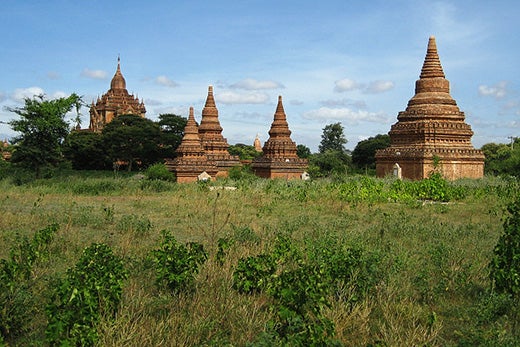
The ancient cities of Bagan, Myanmar, and Luang Prabang, of Lao PDR offer today’s travelers a nostalgic vision of South East Asia: timeless landscapes and exquisite architecture. This vision is in sharp contrast to the rapid pace of recent economic activity in both countries. Myanmar recorded very strong investor interest in last year’s bidding round for oil and gas blocks. This was a clear signal of the successful reform process undertaken so far. In Lao PDR, the mining industry has increased annual production from around US$ 10 million in the early 2000s to well above US$ 1 billion a decade later – contributing around 15 percent of Government revenues in recent years.
Myanmar and Lao PDR both will benefit from ensuring good governance of their extractive industries. Myanmar’s recent accession to the Extractive Industries Transparency Initiative (EITI) offered an opportunity for the two nations to share experience: Myanmar is now a formal member of the EITI with obligation to report on government’s payment streams from oil, gas and mining as well as other licensing decisions. Lao PDR has no EITI reporting requirements but has accumulated important experience after more than a decade of large-scale mine operations.
Lao PDR and Myanmar officials, academics and CSO representatives met in Vientiane in August to share experiences in how to make best use of their countries’ rich mineral and extractive resources. During the consultations Myanmar speakers highlighted how the EITI is already contributing to improved dialogue and trust between CSO, government and operators. A better comprehension of what are at times complex payment flows from companies to government and local authorities is also emerging. Finally, Myanmar has high expectations that adoption of the EITI will help attract reputable international investors with high standards of transparency and operational performance.
With just two mining companies contributing more than 90 percent of total government revenue accruing from mining, Lao PDR officials are focusing attention on broader mining sector governance. A new mining concession system (Flexicadastre) is in the process of implementation – an instrument which would also hold enormous benefits in Myanmar where mining operations are counted in the thousands – largely artisanal mining without proper registration.
A visit to the Ban Houyaxai gold mine in central Lao PDR illustrated the importance of adequate environmental and social management procedures, such as constant water management to avoid contamination and sedimentation of existing water systems. The visit also showed the importance of comprehensive mine development plans which lead to a sustainable foot print of the mine after its eventual depletion and closure. Village leaders and community members highlighted the value of job opportunities at the mine site as well as the business opportunities which occur from sales of vegetable, fish and other supplies to the mine operations.
In sum, the visit and the depth of the discussions revealed that there is great potential for regional collaboration among “frontier market” countries such as the emerging Asian economies. Some of the principles of good governance in the extractive industries, such as the EITI, are still relatively new in the region, but Myanmar has now become the third ASEAN country to join EITI (after Indonesia and the Philippines). Other ASEAN member nations are also showing interest in the EITI. The next step will be the meeting of the International Board of the EITI which will take place on October 14-15 in Myanmar.
The visit was made possible thanks to funding from the British Department for International Development, the EITI Multi-Donor Trust Fund and the World Bank. PanAust Limited hosted the mine site visit to Ban Houayxai.


Join the Conversation